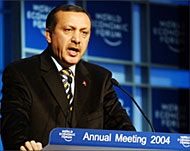Turkey grapples with legacy of abuse
With several recent reports praising human rights improvements in Turkey, the country seems to be moving away from its status as a place where serious abuses happen.

Yet, rights groups within the country have sounded a strong note of caution – while things are getting better, they say, there is still a long way to go.
“The point we are at now with human rights is not a good one,” Mustafa Ercan of the human rights group Mazlum-Der told Aljazeera.net. “It’s just that when compared to the past, it’s a better one.”
On 3 March, the 45-nation Council of Europe assembly approved a draft report recommending dropping Turkey from the list of countries it monitors since 1996 for human rights abuses.
The Council says Turkey has come off the list due to reforms the country has introduced since 2001.
It was in that year that Turks were given the most positive news yet on prospects of one day joining the European Union.
Political killings
Meeting EU criteria against torture has been a pressing political task for Turkish governments ever since.
The US State Department’s Bureau of Democracy, Human Rights and Labour said in its most recent report on Turkey that there had been “improvements in a number of areas”.
|
“The point we are at now with human rights is not a good one. It’s just that when compared to the past, it’s a better one” |
It noted that in 2003 there had been no known political killings, or reports of “disappearances” related to political activity.
Both have plagued Turkey for years, with shootings and disappearances particularly prevalent in the southeast as Turkish troops fought with Kurdish rebels during the 1980s and 1990s.
The same US organisation had reported ten years ago about 33 extra-judicial killings by state security forces in the first ten months of 1994 alone, while 107 people died in “mystery killings”.
These were widely attributed to contra-guerrillas, such as the Islamist Hizb Allah, which fought against Kurdish leftist separatists allegedly with government support.
Abuses continue
“Now the situation there is quite different,” said human rights commentator and analyst Erdal Erinc.
However, “largely this is because the war is over – the separatists have been defeated”.
But despite these various reports, said Hurriyet Sener of the Istanbul branch of the Turkish Human Rights Association (IHD), abuses are continuing.
“The situation in the country’s prisons isn’t any better, the pressure on Kurdish identity continues. There have been some changes in the appearances of things, but not practical on the ground implementation.”
It is a complaint that is widespread despite the government passing an unprecedented amount of legislation to raise standards.
“For us,” added Ercan, “it’s better to give importance to actual observations on the ground than to what it says in reports.
Freedom of speech
 |
|
PM Erdogan has overseen human |
“This also means that the change we want to see is an overall one – in the practice of the state, the government, the police and in civil society itself.”
It is a point also taken up by the US State Department report.
“Several serious problems remained,” the report states.
“Security forces reportedly killed 43 persons during the year; torture, beatings, and other abuses by security forces remained widespread. Prison conditions remained poor.
“Security forces continued to use arbitrary arrest and detention … The rarity of convictions and the light sentences imposed on police and other security officials for killings and torture continued to foster a climate of impunity.”
The report also singled out a legal structure that “favoured government interests over individual rights, alongside the continued limitation of freedom of speech and press”.
Military rule
It adds, “At times, the government restricted freedom of assembly and association. Police beat, abused, detained, and harassed some demonstrators.”
Behind this reluctance to actually implement laws passed, lies the nature of the Turkish state itself, said the IHD’s Sener.
“Without the complete civilianisation of the country the problem can’t be changed.”
Sener pointed to the continuing role of the Turkish military in the country, which remains powerful, despite recent moves to restrict it.
“We want the generals out of politics. We want the country to become a country of law,” she said.
The US report also said there had been abuses against religious freedom.
“The government imposed some restrictions on Muslim and other religious groups,” it reads, “and on Muslim religious expression in government offices and state-run institutions, including universities.”
Securing rights
|
“Without the complete civilianisation of the country the problem can’t be changed. We want the generals out of politics. We want the country to become a country of law” Hurriyet Sener,The Turkish Human Rights Association |
The banning of Muslim women who wear headscarves from university campuses and state institutions has been a highly controversial policy in Turkey.
While privately the government may want to abandon this restriction, the country’s powerful secularist establishment is strongly opposed to any change.
But change is also widely welcome – even if it still has far to go.
“At the moment,” said Ercan, “there has been a decrease in torture by police – at least in non-political cases. The police attacks on civil organisations have also decreased … With all these EU harmonisation laws there has been a partial improvement.”
However, he added, “What we want now is a public that demands its own rights – a public that does its own human rights monitoring – that has that awareness.”
Sener agreed, “Making Turkey a more democratic place is ultimately not just about human rights reports written by foreign organisations.
“It’s about the country’s own internal dynamics. That’s why we’re saying that everyone in this country must play a part in securing these rights – they are things all of us have to bring about.”